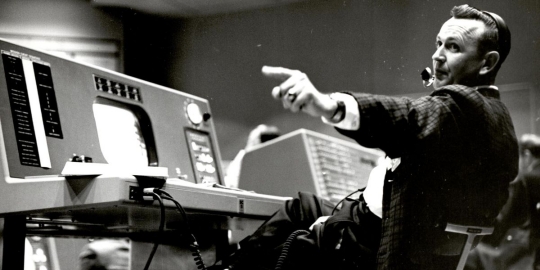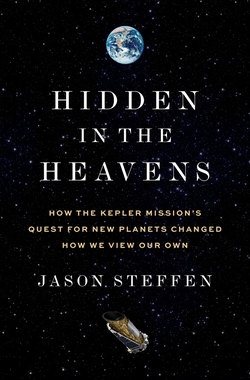As a poignant and unexpected coda to the celebrations of the Apollo 11 anniversary we learn of the death of Chris Kraft, the man who created NASA’s Mission Control from scratch in the early days of the manned space program and was head of Flight Operations during that critical period. Death came at age 95 to a man who worked at ground zero in the fraught days of Mercury and Gemini, serving as flight director for all the Mercury missions and seven of the Gemini flights. Neil Armstrong would say of Kraft that he was “the ‘Control’ in Mission Control.”

Image: Christopher Kraft, flight director during Project Mercury, works at his console inside the Flight Control area at Mercury Mission Control in Houston. Kraft, the founder of NASA’s Mission Control, died Monday, July 22, 2019, just two days after the 50th anniversary of the Apollo 11 moon landing. He was 95. Credit: NASA via AP.
After his work with Gemini, Kraft moved up NASA management ranks and became a senior planner for the Apollo program. He went on to lead the Johnson Space Center in Houston and was deeply involved in the Space Shuttle program, though for many of us, he will always be the voice we heard in TV coverage of missions dating back to Alan Shepard’s suborbital shot in 1961, a mission during which he later admitted he was ‘shaking like a leaf’ (it certainly never showed, and Kraft added that his nerves steadied considerably after the Shepard flight).
The challenge presented to Kraft was immense, coordinating the inputs from the dozens of controllers who tracked spacecraft operations while balancing teams of researchers and engineers in an environment that could demand quick, decisive action to save a mission. Go to Houston today and you’ll see that Mission Control Center at JSC is named after Kraft, whose legacy is not just a room of controllers but the very concept of flight management still in use.
Al Jackson, who knew Kraft through his work on the Lunar Module Simulator, wrote this morning with his own recollection of the man, calling Kraft ‘the best technical manager I ever met,’ and adding:
The training simulator group rarely had to meet with him, but every now and then the crews would want some kind of modification to the simulators, so we would go to his office. I always liked those meeting because they were short! The problem would be presented and Kraft, once it was clear to him, would make the decision on what to do. There was no extra talk; he just said “you will do this and this and this”… and the meeting was over usually in less than 30 minutes. I have never met another technical manager like him. He was an exceptional man.

Image: A 40th anniversary panel on Apollo 8 organized by Al Jackson in 2008. Left to right: Marty Jenness, Dr. Christopher Kraft, John Llewellyn, Dr. Glynn Lunney (with Ken Young behind him), Emil Shiesser, Al Jackson. Front row: Hal Beck, Rod Rose. Credit: Al Jackson.
Retiring in 1982, Kraft maintained an active interest in the space program as he pursued consulting options. This NPR article quotes him as he reflected on his career:
“I flew on every flight — vicariously. I didn’t have to go. I mean that. I used to tell people back then when we’re flying, I have this feeling that’s what we’re doing all the time. And then when we stop flying, I don’t believe we did it. That was a strange feeling. … I was in my revelry when we were flying. My people were the same way. It was such a tremendous pleasure out of making things happen well and safely and knowing that they were contributing to that part of the program. I think it was extremely important to all of us and that was our payoff. We didn’t make any money working for the government. But we sure got a hell of a lot of enjoyment out of it.”
This has been a summer of memories as we recalled the events leading to the Apollo landings. Playing through all of that history has been the steady and disciplined guidance provided by people like Chris Kraft, who were tasked with a job — going to the Moon! — that seemed insurmountable at a time when America’s experience in space was limited to a single 15-minute suborbital flight. There were truly giants in those days, and Chris Kraft was one of them.



Some notes on the group photo above , taken at a panel discussion in 2008 about Apollo 8.
Kraft’s directorate had four divisions in it:
Flight Control Division : The famous Mission Control , Glynn Lunney ,above, was a flight director in that division, in fact he was the main FD on Apollo 8.
Landing and Recovery Division
Flight Support Division : I was in that Division, the training simulators were in that division, I was in that.
Mission Planning and Analysis Division: That is all the rest of those guys in that picture. MPAD I have mentioned before as a unique group.
Two guys above had important tasks in Apollo … Marty Jenness was one of the designers of the trans lunar, lunar orbit, and return orbits.
Emil Shiesser , a quite and uber brilliant engineer had to make sure that the software that tracked Apollo 8 to the Moon worked and was validated, which , tho already in hand, guaranteeing that this would all work from a standing start in August of 1968 to December of 1968 was a Herculean task!
That Kraft served as the conductor all of all this and make sure it worked is amazing.
For Apollo the hand that rocked the cradle was an amazing web of incredible people.
Al, do you have any knowledge or have any references to documentation as to how this was done?
Alex do you mean documentation of the validation of the tracking network and computers and software that enabled that part of Apollo 8?
Tell you it could be on line I am surprised at how much has been put up , it might be in here:
https://www.ibiblio.org/apollo/Documents/
However I know many internal MSC documents have yet to be put on line, not because they are secret but because there are so many of them! I don’t have them.
If Emil Shiesser was till alive I could ask him alas he also has passed.
One has the sense of a crystalizing history as the astronauts and key Nasa figures go to their graves. Gone are any further first-hand reminiscences of that first great age of human spaceflight. As the moon-walkers disappear, so too do the voices of those who can counter the nonsense Moon hoax conspiracies, much as has happened with the Holocaust.
We should be living in an age of increased science literacy, yet the visibility and cacophony of fake-this and fake-that are almost depressing. It feels like the Age of Western Enlightenment is dying, not with a whimper, but with shouts of glee by the anti-science crowd. I cannot imagine how this era will be looked back upon a century from now. I hope it will be a heroic age of humans breaking the bonds of Earth for a bright future, with the astronauts (both US and Russian) as legends preserved in time by the voluminous filmed footage for historical evidence. While the astronauts may be our Jasons, Kraft and his contemporaries are the Argus’ of these space odysseys.
The 2006 film Idiocracy is becoming prophecy, centuries before it takes place in the story:
https://en.wikipedia.org/wiki/Idiocracy
Ironically, much of the problem you state stems from too easy access to too much information, with a combination of poor filtering and many people lacking critical thinking skills.
Fewer people have to remember things as the can get the answer literally at their fingertips, or a simple voice command.
The modern version of “A little knowledge is dangerous”?
It is more than this though. The information noise is replete with propaganda and misinformation, disseminated by the tools of information access. While we have always had to deal with these malefactors, the stakes are becoming very high, indeed existential.
Institutions that were once to be trusted, are being corrupted or gutted. National political executives are part of this problem.
I am reminded of Neal Stephenson’s “Anathem” where the protagonist uses an information network where the factoids are vetted/rated as trustworthy. A nice idea, but who is doing the vetting/rating? Today that is done on a small scale by Snopes.com and the many fact-checking journalists. But it is far too little and doesn’t take into account human nature concerning use. I don’t know what the solutions are, but we need them, and soon.
I know him best for wanting to use the shuttle more often–to accept risks
https://en.wikipedia.org/wiki/Christopher_C._Kraft_Jr.#Consultant